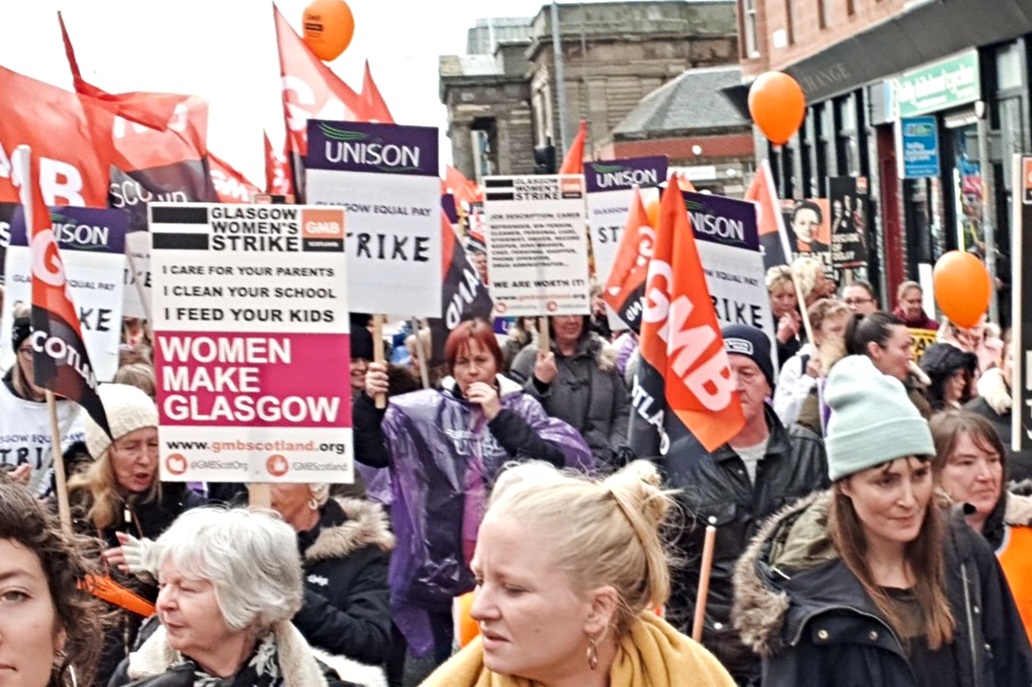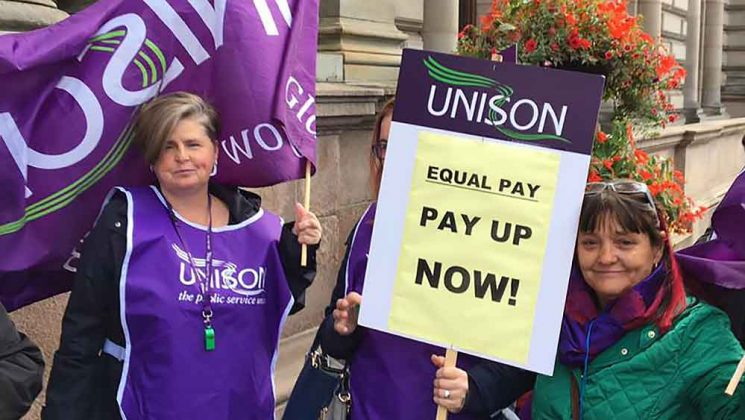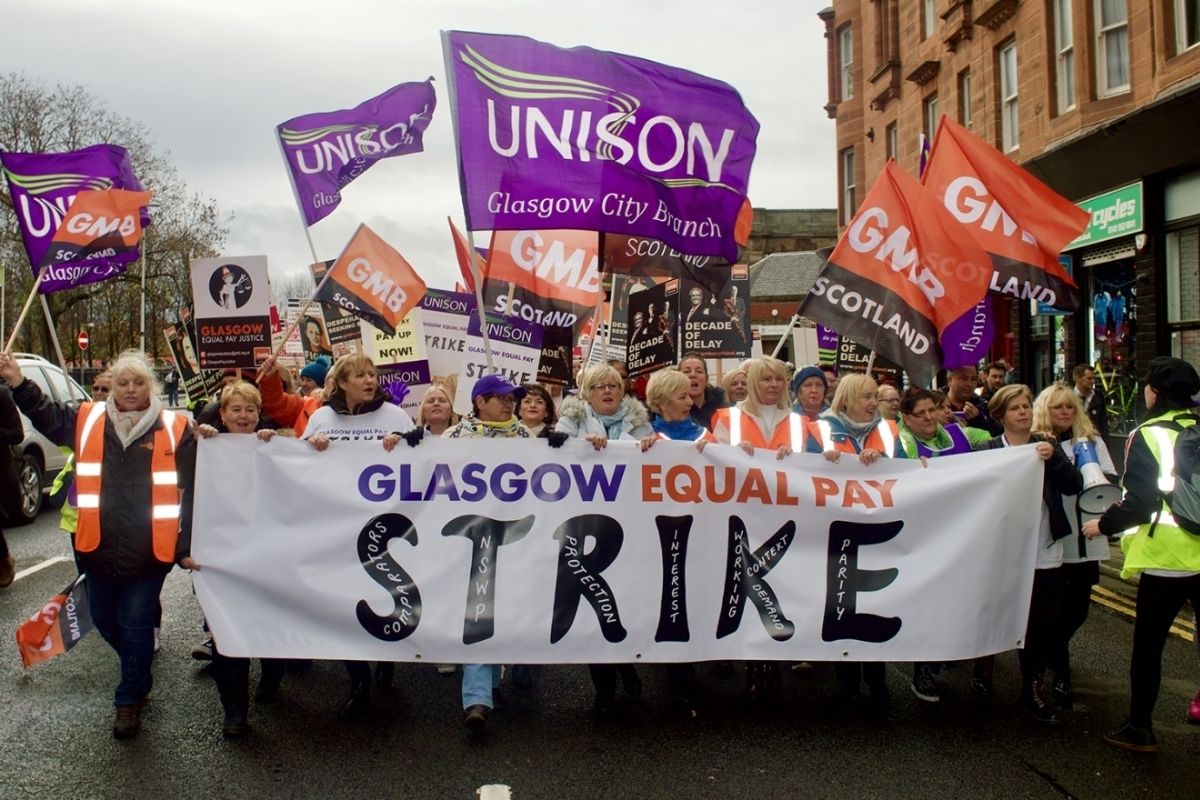Thousands of workers at Glasgow city council are set to take strike action at the end of this month, in a long-running fight against pay inequality. To end discrimination, we need united class struggle to end all exploitation and austerity.
Tensions are running high at Glasgow city council as workers’ discontent brews.
Earlier this month, Unison and GMB members at the council voted overwhelmingly in favour of strike action. As a result, 12,000 workers are set to strike for two days on 29-30 March, and again in April if their demands are not met, potentially bringing the city to a halt.
The dispute concerns unequal pay for women employed by the council, with some receiving up to £3 less per hour than male colleagues in corresponding pay grades.
The issue is longrunning – originating with the council’s implementation of the Workforce Pay and Benefits Review System in 2006, which was supposed to better women’s pay and lessen the gender pay gap.
But this did nothing to improve pay in female-dominated occupations, such as cleaning, catering and care. In fact, the courts ruled in 2017 that the council’s system was actively discriminatory towards women.
Confrontation

Things came to a head in 2018, when thousands of women went on strike in the city.
This huge show of workers’ power resulted in an agreement in 2019, which saw a settlement of £500 million for existing pay claims, as well as promises of a new pay and grading system.
Scandalously, however, these workers are still not receiving the fair pay that they have been fighting for. Some even face a wait until 2024 for their payout.
Unison states that there are still around 25,000 claimants who have not received any compensation from the council. And the union rightly points out that the current cost-of-living crisis is worsening the situation even further.
The purpose of any upcoming strike action, therefore, is to guarantee payment of these settlements, and to prevent any attempts by the council to delay payments even further in this already decades-old conflict.
Strength
Both GMB and Unison members have shown strong support for engaging in strike action, with 98% and 96% of ballots, respectively, coming back in favour of striking.
This demonstrates the depth of anger that exists within these workforces. It also demonstrates that council workers understand the power in their hands.
As these workers demonstrated in their last wave of action, such a strike could paralyse the city.
Many of the workers involved in the dispute are employed in essential roles, working in healthcare, social care, nurseries, and schools. Even the threat of strike, therefore, is putting the council under pressure to make good on their promises.
As has been clearly demonstrated during the past two years of the pandemic, the working class – if organised and mobilised – holds an enormous potential power in their hands. If they stop working, so does the very functioning of society.
These are the people we rely on to keep our services and communities running: not the bureaucrats in Glasgow city council, nor in Holyrood for that matter, but the workers.
Oppression

Unsurprisingly, council bosses have come out against the workers and their demands. Leader of Glasgow city council Susan Aitken, for example, has even stated that she “genuinely doesn’t understand” the need for the workers to go on strike.
Their arrogance is truly breathtaking. Presumably they expect women workers to simply back and watch their pay and conditions get worse and worse, all while Ms. Aitken and the other council leaders dither!
The employers seem to think that, because women have historically been the occupants of such an exploited position in society, they will not fight back against low pay and poor working conditions.
The 2018 strike, however, alongside other movements over the past half decade, have proven otherwise. Women workers, like their male colleagues, are sick and tired of being taken advantage of. That is why they’re fighting now.
Rampant exploitation and mistreatment still plague women all over the world, including in many so-called ‘developed’ nations, like Scotland. And this injustice continues despite reforms – like the 1970 Equal Pay Act – that were introduced in order to supposedly tackle said inequalities.
Unity
The reality is that women workers remain underpaid, overworked, and abused.
But it is clear that these ills cannot be cured under capitalism – a bankrupt system which, ridden with crises, offers not reforms, but counter-reforms; not liberation and equality, but oppression and exploitation.
The strongest weapon in the arsenal of the workers’ movement is unity in action. In Glasgow city council, this means men and women workers uniting in the fight against all discrimination, austerity, and attacks.
All union members must therefore take up this struggle. Solidarity is crucial. The alternative is a race to the bottom on wages and conditions, as the ruling class looks to present workers with the bill for the crisis.
The problems faced by Glasgow council workers are not unique. Workers everywhere are facing the squeeze. These movements must be linked together and the fight generalised.
It is only through united struggle against the employers that workers can overcome the divide-and-rule tactics of the bosses, and bring a socialist programme to the fore to end exploitation and oppression once and for all.






